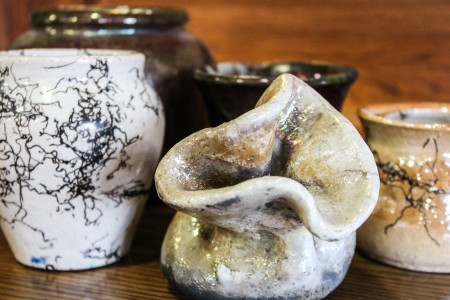
The Grinnell Arts Center will be hosting its annual open-air workshop for raku pottery at 926 Broad St. this Saturday, Sept. 27 from 9 a.m. to 3 p.m.
Raku is a pottery process originating from Japan and characterized by low-firing temperatures and hand-shaped bowls. Traditional Japanese raku pieces are used in the Japanese Tea Ceremony, and are most commonly tea bowls. Western-style raku uses fire and smoke to create unique colors and designs in glazes and clay bodies.
The street will be blocked off for the event, which the Grinnell Area Arts Council has held for the last 10 years, according to director Mary Rellergert ’13.
Attendees are free to purchase a piece of pottery to decorate, which will then be baked in a kiln by Tom and Wanda Clarke, two potters from South Dakota, who have run the workshop since its inception. The pieces range from five to 20 dollars, depending on the size and complexity of the item. Materials for glazing are provided.
The workshop has been very successful in years past. “It’s a make-and-take workshop. People love to come to the workshop and be able to leave with something in their hands … You don’t have to have any experience with raku before to be able to create something really beautiful,” Rellergert said.
While other types of pottery might need 20 hours to bake, the process for the raku piece should take less than three hours. Raku pottery is unique in its baking technique—pots are first fired in the kiln and then treated with smoke, which creates unusual effects in freshly-glazed pots. In addition to various types of glazes, placing horsehair on the surface of a pot can create enchanting patterns of dark lines after firing.
“It’s a pretty unpredictable process, which actually makes it fun because you never know exactly what you’re going to get, and often it’s really neat,” Rellergert said.
Over the past several months, three local ceramicists, including Grinnell College librarian Cecilia Knight, have been preparing for Saturday by throwing the purchasable pots and creating other wares for the workshop.
“I made about 70 pieces for this year, and I think about 20 of them are whistles of various kinds, instead of pots, something a little more fun,” Knight said.
A variety of pots and other ceramic wares will be available as options for the workshop, but Knight cautioned against using water in raku pieces. “Raku isn’t fired as hot as other pots are, so they don’t do well at holding water … It would be a bad idea for your furniture,” Knight said.
The organizers anticipate fair weather for Saturday in creating an enjoyable daylong workshop with community members and college families.
“I really like the community coming out and doing this. I’ll meet a lot of people [and] I help out with the glazing station during the daytime. I get to talk with everybody,” Knight said.























































